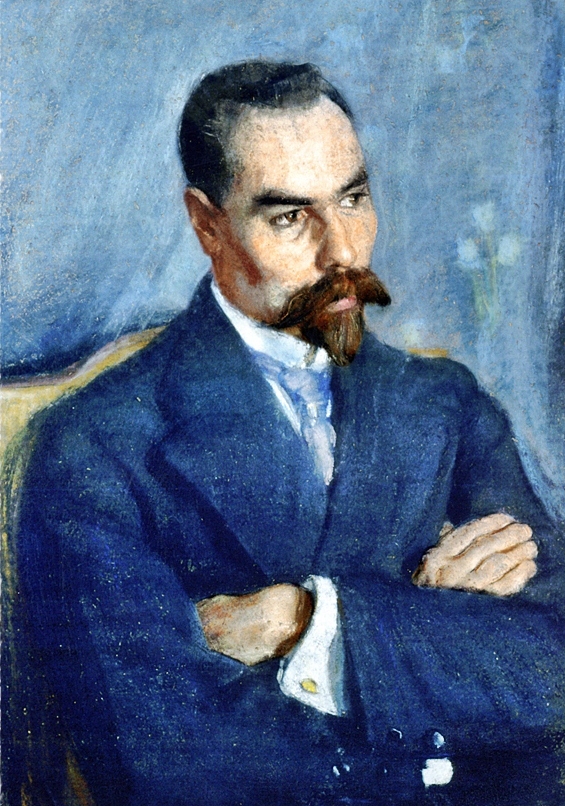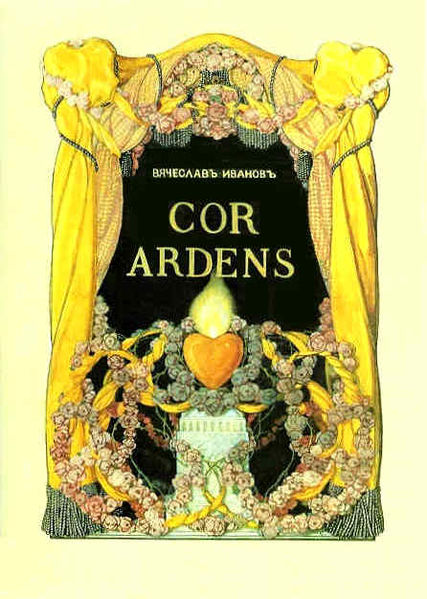|
Sergei Gorodetsky
Sergey Mitrofanovich Gorodetsky (; – June 8, 1967) was a poet who lived in the Russian Empire and then the Soviet Union. He was one of the founders (together with Nikolay Gumilev) of "Guild of Poets" (). He was born in Saint Petersburg, and died in Obninsk. Gorodetsky entered the literary scene as a Symbolism (arts), Symbolist, developing friendships with Alexander Blok, Vyacheslav Ivanov (poet), Vyacheslav Ivanov, and Valery Bryusov, Valery Briusov. Following his brief stint with Symbolists, Gorodetsky began to associate with younger poets, forming the Acmeist poetry, Acmeist group with Nikolai Gumilev, Anna Akhmatova, and Osip Mandelshtam. Subsequently, abandoning yet another group, he welcomed the October Revolution, Bolshevik revolution as a Soviet poet. References External links English translations of 2 poems by Babette Deutsch and Avrahm Yarmolinsky, 1921The Poems by Sergey Gorodetsky (English) {{DEFAULTSORT:Gorodetsky, Sergey Poets from the Russian Empire Sovi ... [...More Info...] [...Related Items...] OR: [Wikipedia] [Google] [Baidu] |
Gorodetsky By Repin
Gorodetsky (masculine), Gorodetskaya (feminine), or Gorodetskoye (neuter) may refer to: *Gorodetsky (surname) *Gorodetsky District, a district of Nizhny Novgorod Oblast, Russia *Gorodetsky (rural locality) (''Gorodetskaya'', ''Gorodetskoye''), name of several rural localities in Russia See also *Mayak Gorodetsky, a rural locality in Ostrovnoy, Murmansk Oblast, Russia {{Disambiguation, geo ... [...More Info...] [...Related Items...] OR: [Wikipedia] [Google] [Baidu] |
Acmeist Poetry
Acmeism, or the Guild of Poets, was a transient poetic school, which emerged in 1912 in Russia under the leadership of Nikolay Gumilev and Sergei Gorodetsky. Their ideals were compactness of form and clarity of expression. The term was coined after the Greek word άκμη (''ákmē''), i.e., "the best age of man". The acmeist mood was first announced by Mikhail Kuzmin in his 1910 essay "Concerning Beautiful Clarity". The acmeists contrasted the ideal of Apollonian clarity (hence the name of their journal, '' Apollon'') to "Dionysian frenzy" propagated by the Russian symbolist poets like Bely and Vyacheslav Ivanov. To the Symbolists' preoccupation with "intimations through symbols" they preferred "direct expression through images". In his later manifesto "The Morning of Acmeism" (1913), Osip Mandelstam defined the movement as "a yearning for world culture". As a " neo-classical form of modernism", which essentialized "poetic craft and cultural continuity", the Guild of Poets place ... [...More Info...] [...Related Items...] OR: [Wikipedia] [Google] [Baidu] |
Soviet Poets
This is a list of authors who have written poetry in the Russian language. Alphabetical list A B C D E F G I K L M N O P R S T U V Y Z Sources See also * List of Russian architects * List of Russian artists * List of Russian explorers * List of Russian inventors * List of Russian-language novelists * List of Russian-language playwrights * List of Russian-language writers * Russian culture * Russian poetry * Russian literature * Russian language * :Russian poets {{DEFAULTSORT:List Of Russian Language Poets Russian Poets A poet is a person who studies and creates poetry. Poets may describe themselves as such or be described as such by others. A poet may simply be the creator ( thinker, songwriter, writer, or author) who creates (composes) poems (oral or writt ... Russian literature-related lists de:Liste russischsprachiger Dichter ... [...More Info...] [...Related Items...] OR: [Wikipedia] [Google] [Baidu] |
Poets From The Russian Empire
A poet is a person who studies and creates poetry. Poets may describe themselves as such or be described as such by others. A poet may simply be the creator (thought, thinker, songwriter, writer, or author) who creates (composes) poems (oral tradition, oral or literature, written), or they may also performance, perform their art to an audience. The work of a poet is essentially one of communication, expressing ideas either in a literal sense (such as communicating about a specific event or place) or metaphorically. Poets have existed since prehistory, in nearly all languages, and have produced works that vary greatly in different cultures and periods. Throughout each civilization and language, poets have used various styles that have changed over time, resulting in countless poets as diverse as the literature that (since the advent of writing systems) they have produced. History In Ancient Rome, professional poets were generally sponsored by patronage, patrons, wealthy sup ... [...More Info...] [...Related Items...] OR: [Wikipedia] [Google] [Baidu] |
October Revolution
The October Revolution,. officially known as the Great October Socialist Revolution. in the Soviet Union, also known as the Bolshevik Revolution, was a revolution in Russia led by the Bolshevik Party of Vladimir Lenin that was a key moment in the larger Russian Revolution of 1917–1923. It was the second revolutionary change of government in Russia in 1917. It took place through an armed insurrection in Petrograd (now Saint Petersburg) on . It was the precipitating event of the Russian Civil War. The October Revolution followed and capitalized on the February Revolution earlier that year, which had overthrown the Tsarist autocracy, resulting in a liberal provisional government. The provisional government had taken power after being proclaimed by Grand Duke Michael, Tsar Nicholas II's younger brother, who declined to take power after the Tsar stepped down. During this time, urban workers began to organize into councils (soviets) wherein revolutionaries criticized the pro ... [...More Info...] [...Related Items...] OR: [Wikipedia] [Google] [Baidu] |
Osip Mandelshtam
Osip Emilyevich Mandelstam ( rus, Осип Эмильевич Мандельштам, p=ˈosʲɪp ɨˈmʲilʲjɪvʲɪtɕ mənʲdʲɪlʲˈʂtam; – 27 December 1938) was a Russian Empire, Russian and Soviet Union, Soviet poet. He was one of the foremost members of the Acmeist poetry, Acmeist school. Osip Mandelstam was arrested during the repression of the 1930s and sent into internal exile with his wife, Nadezhda Mandelstam. Given a reprieve of sorts, they moved to Voronezh in southwestern Russia. In 1938 Mandelstam was arrested again and sentenced to five years in a corrective-labour camp in the Soviet Far East. He died that year at a transit camp near Vladivostok. Life and work Mandelstam was born on 14 January 1891 in Warsaw, Congress Poland, Russian Empire to a wealthy Polish-Jewish family. His father, a leather merchant by trade, was able to receive a dispensation freeing the family from the Pale of Settlement. Soon after Osip's birth, they moved to Saint Petersburg. I ... [...More Info...] [...Related Items...] OR: [Wikipedia] [Google] [Baidu] |
Anna Akhmatova
Anna Andreyevna Gorenko rus, А́нна Андре́евна Горе́нко, p=ˈanːə ɐnˈdrʲe(j)ɪvnə ɡɐˈrʲɛnkə, a=Anna Andreyevna Gorenko.ru.oga, links=yes; uk, А́нна Андрі́ївна Горе́нко, Ánna Andríyivna Horénko, . ( – 5 March 1966), better known by the pen name Anna Akhmatova,. was one of the most significant Russian poets of 20th century. She was shortlisted for the Nobel Prize in 1965 and received second-most (three) nominations for the award the following year. Akhmatova's work ranges from short lyric poems to intricately structured cycles, such as ''Requiem'' (1935–40), her tragic masterpiece about the Stalinist terror. Her style, characterised by its economy and emotional restraint, was strikingly original and distinctive to her contemporaries. The strong and clear leading female voice struck a new chord in Russian poetry.Harrington (2006) p. 11 Her writing can be said to fall into two periods – the early work (1912–25) ... [...More Info...] [...Related Items...] OR: [Wikipedia] [Google] [Baidu] |
Nikolai Gumilev
Nikolay Stepanovich Gumilyov ( rus, Никола́й Степа́нович Гумилёв, p=nʲɪkɐˈlaj sʲtʲɪˈpanəvʲɪtɕ ɡʊmʲɪˈlʲɵf, a=Nikolay Styepanovich Gumilyov.ru.vorb.oga; April 15 Adoption of the Gregorian calendar#Adoption in Eastern Europe, NS 1886 – August 26, 1921) was a poet, literary critic, traveler, and military officer. He was a cofounder of the Acmeist poetry, Acmeist movement. He was husband of Anna Akhmatova and father of Lev Gumilev. Nikolay Gumilyov was Tagantsev conspiracy, arrested and executed by the Cheka, the secret Soviet police force, in 1921. Early life and poems Nikolay Gumilyov was born in the town of Kronstadt on Kotlin Island, into the family of Stepan Yakovlevich Gumilyov (1836–1910), a naval physician, and Anna Ivanovna L'vova (1854–1942). His childhood nickname was "Montigomo," the Hawk's Claw."Gumilyov's Magic Wand". Mikhail Sinelnikov. ''Moscow News'' (Russia). CULTURE; No. 15. April 18, 1996. He studied at the gymnas ... [...More Info...] [...Related Items...] OR: [Wikipedia] [Google] [Baidu] |
Valery Bryusov
Valery Yakovlevich Bryusov ( rus, Вале́рий Я́ковлевич Брю́сов, p=vɐˈlʲerʲɪj ˈjakəvlʲɪvʲɪdʑ ˈbrʲusəf, a=Valyeriy Yakovlyevich Bryusov.ru.vorb.oga; – 9 October 1924) was a Russian poet, prose writer, dramatist, translator, critic and historian. He was one of the principal members of the Russian Symbolism, Russian Symbolist movement.Darko Suvin, "Bryusov,Valery" in Curtis C. Smith, ''Twentieth-Century Science-Fiction Writers''. Chicago, St. James, 1986. (pp. 840–41). Background Valery Bryusov was born on 13 December 1873 (1 December 1873 according to the old Julian calendar) into a merchant's family in Moscow. His parents were educated for their class and had some literary associations, but had little do with his upbringing, leaving the boy largely to himself. He spent a great deal of time reading "everything that fell into [his] hands", including the works of Charles Darwin and Jules Verne, as well as various materialism , material ... [...More Info...] [...Related Items...] OR: [Wikipedia] [Google] [Baidu] |
Poet
A poet is a person who studies and creates poetry. Poets may describe themselves as such or be described as such by others. A poet may simply be the creator ( thinker, songwriter, writer, or author) who creates (composes) poems (oral or written), or they may also perform their art to an audience. The work of a poet is essentially one of communication, expressing ideas either in a literal sense (such as communicating about a specific event or place) or metaphorically. Poets have existed since prehistory, in nearly all languages, and have produced works that vary greatly in different cultures and periods. Throughout each civilization and language, poets have used various styles that have changed over time, resulting in countless poets as diverse as the literature that (since the advent of writing systems) they have produced. History In Ancient Rome, professional poets were generally sponsored by patrons, wealthy supporters including nobility and military officials. For inst ... [...More Info...] [...Related Items...] OR: [Wikipedia] [Google] [Baidu] |
Vyacheslav Ivanov (poet)
Vyacheslav Ivanovich Ivanov (russian: Вячесла́в Ива́нович Ива́нов; – 16 July 1949) was a Russian poet and playwright associated with the Russian Symbolism, Russian Symbolist movement. He was also a philosopher, translator, and literary critic. Early life Born in Moscow, Ivanov graduated from the First Moscow Gymnasium with a gold medal and entered the Moscow University where he studied history and philosophy under Sir Paul Vinogradoff. In 1886, he moved to the Berlin University to study Roman law and economics under Theodor Mommsen. During his stay in Germany, he absorbed the thoughts of Friedrich Nietzsche and German Romantics, notably Novalis and Friedrich Hölderlin. In 1886 Ivanov married Darya Mikhailovna Dmitrievskaya, the sister of his close childhood friend Aleksei Dmitrievsky. From 1892 he studied archaeology in Rome, completing his doctoral dissertation there. In 1893 he met Lydia Zinovieva-Annibal, a poet and translator. Having both rece ... [...More Info...] [...Related Items...] OR: [Wikipedia] [Google] [Baidu] |
Alexander Blok
Alexander Alexandrovich Blok ( rus, Алекса́ндр Алекса́ндрович Бло́к, p=ɐlʲɪˈksandr ɐlʲɪˈksandrəvʲɪtɕ ˈblok, a=Ru-Alyeksandr Alyeksandrovich Blok.oga; 7 August 1921) was a Russian lyrical poet, writer, publicist, playwright, translator and literary critic. Early life Blok was born in Saint Petersburg, into an intellectual family of Alexander Lvovich Blok and Alexandra Andreevna Beketova. His father was a law professor in Warsaw, and his maternal grandfather, Andrey Beketov, was a famous botanist and the rector of Saint Petersburg State University. After his parents' separation, Blok lived with aristocratic relatives at the manor Shakhmatovo near Moscow, where he discovered the philosophy of Vladimir Solovyov, and the verse of then-obscure 19th-century poets, Fyodor Tyutchev and Afanasy Fet. These influences would affect his early publications, later collected in the book ''Ante Lucem''. Career and marriage In 1903 he married the actress ... [...More Info...] [...Related Items...] OR: [Wikipedia] [Google] [Baidu] |



.jpg)

.jpg)

